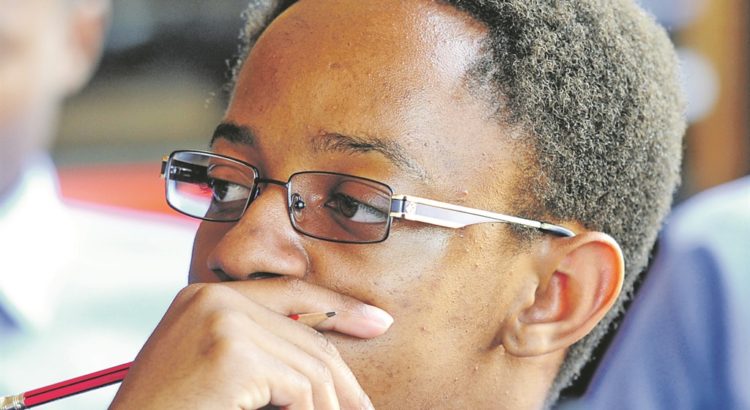Africa/Sudáfrica/Junio 2016/Autor: Sipho Masondo / Fuente: city-press.news24.com
Resumen: Universidad publica un estudio concluyente que cita la influencia indebida de los sindicatos, falta de conocimiento de los contenidos por parte del profesor y muy poco tiempo para el aprendizaje.
South Africa’s education system will not work effectively until undue union influence and critical educational factors are resolved, according to Stellenbosch University researchers.
They describe these factors as binding constraints, which include weak institutional functionality, poor teacher content knowledge and insufficient learning time for pupils.
The findings are included in a summary of several education-related research papers produced by education experts affiliated to the University of Stellenbosch’s Research on Socio-Economic Policy unit.
“The binding constraints approach argues that some problems are so severe that, unless they are first resolved, no amount of money or time spent solving the less severe problems will help,” says the study, titled “Identifying Binding Constraints in SA Education”.
It maintains that there are some critical educational inputs or factors without which learning cannot effectively take place.
The report reflects concerns expressed by academics, practitioners and the public at large about the influence exerted by unions, especially the SA Democratic Teachers’ Union (Sadtu) – perceived as interfering with the ability of the education system “to act in the best interests of children”.
“This in turn undermines efforts to implement higher levels of accountability and compromises capabilities in the sector,” the researchers conclude.
The report is another independent study to support Department of Basic Education Minister Angie Motshekga’s report on jobs for cash.
That study, published two weeks ago by City Press, found that Sadtu officials had captured the education system and were in effect running education in six provinces: North West, KwaZulu-Natal, Gauteng, Limpopo, Mpumalanga and Eastern Cape.
These researchers found that beyond advocating for improved pay, benefits and conditions of work, “Sadtu remained strongly opposed to national policies implementing any forms of monitoring or control of teachers’ work, even where accountability systems were disconnected from punitive measures”.
The report called for unions to be held accountable for their conduct in schools.
Sadtu has consistently refused its cooperation. Methods the department is introducing to hold teachers accountable include testing teachers’ and principals’ competencies, periodic evaluation of teachers, performance contracts for principals, a biometric clocking system to monitor teachers’ comings and goings, pay that is linked to performance, making education an essential service and the introduction of inspectors to monitor the delivery of the curriculum.
Sadtu has consistently rejected all these initiatives.
A number of studies contained in the report jointly found that in many schools, fewer than half of the official curriculum was being covered by the end of the year and fewer than half of the officially scheduled lessons were being taught.
Researchers laid the blame at the door of: inadequate teaching time; teacher absenteeism; and insufficient opportunity for pupils to learn.
The report said the National School Effectiveness Study showed that most Grade 5 pupils wrote in their books only once a week, or less. It added that only 3% of Grade 5 pupils across the country wrote in their books every day.
“Of greatest concern is how little extended writing there is in the books… [pupils] write one paragraph every month. In one instance, a shocking 44% of the Grade 4 pupils had not written any paragraphs during the entire school year,” the report charged.
On inadequate teaching time, the report observed that out of the 130 maths lessons scheduled for Grade 6 pupils during the 2012 academic year in 58 schools in North West, teachers had only administered 50 lessons by November.
“The researchers note that frequently the problem was not teacher absenteeism but rather a lack of teaching activity, despite teacher presence,” it said.
While it has long been established that teacher content knowledge is significantly related to learning outcomes, the report has concluded that raising teacher knowledge on its own was also insufficient.
“Teachers need to know how to translate that knowledge for effective learning in the classroom. This implies that content knowledge and pedagogical skills both need to be good.”
For example, the 2007 South and Eastern Africa Consortium for Monitoring Educational Quality showed that only 32% of Grade 6 maths teachers in South Africa had desirable subject knowledge, said the report.
On weak institutional functionality, the report attributed the underperformance of many pupils in provinces such as the Eastern Cape and Limpopo to poor administration.
Research conducted in Gauteng schools, which previously fell under North West before the changing of provincial boundaries in 2005, revealed improvements after their incorporation into Gauteng because a better-performing province was associated with improved student performance.
Fuente de la noticia: http://city-press.news24.com/News/education-in-south-africa-a-system-in-crisis-20160531
Fuente de la imagen: http://cdn.24.co.za/files/Cms/General/d/4035/52aadfc2eb0b41a88f17eb3bae7c46f7.jpg






 Users Today : 7
Users Today : 7 Total Users : 35459913
Total Users : 35459913 Views Today : 7
Views Today : 7 Total views : 3418472
Total views : 3418472